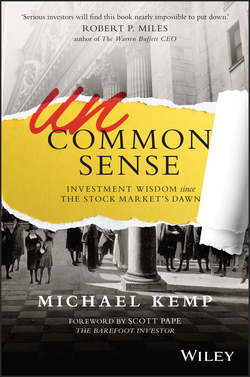Читать книгу Uncommon Sense - Pape Scott - Страница 14
На сайте Литреса книга снята с продажи.
Part I
THE LIMITSOF REASON
2
THE ART OF PREDICTION
UNLIMITED POSSIBILITIES
ОглавлениеRemember the movie Sliding Doors? For those who didn't see it, Gwyneth Paltrow plays a young woman who just misses boarding a train on the London Underground. The film then splits into two universes. The first is based on how her life actually worked out and the second on how things would have been had she boarded the train. The film switches between each of her parallel lives, showing how a seemingly inconsequential event, like missing a train, can have a profound effect.
Here's a real example of the same thing. At the outbreak of World War I a young Austrian painter volunteered to fight with the German army in the trenches of Europe. He served as a dispatch runner with the Sixteenth Bavarian Infantry Regiment, never rising above the rank of lance corporal. He was awarded six medals for regularly putting himself in the path of enemy fire. His regiment was decimated in battle, rebuilt and decimated again, yet he escaped serious injury. The only injury he sustained during his military service was a wound to his leg inflicted by a stray shell fragment during the Battle of the Somme. It was an injury from which he fully recovered. If the shell had caused a mortal blow, world history would have been altered. The man was Adolf Hitler.
Had Hitler been killed during World War I, as could so easily have happened, the demographics of the world's population would be profoundly different today. Not only would six million Jews who died at his dictate have had the benefit of living, but so too would their never-to-be-born descendants. Total World War II civilian and military deaths were around ten times that figure. That's millions of people who were never given the opportunity to create a family lineage of their own, hundreds of millions of people who might have lived but never did. It's a world so different it's impossible to imagine.
And of course on the other side of the ledger are those living today who otherwise wouldn't be. I'm the son of an Australian Lancaster pilot who met his English bride in London during World War II. It has crossed my mind that if Hitler had copped a bullet in 1915 then I wouldn't be here today, and nor would millions of others.
One small event would have had a profound effect on the population of the world, not just today but to the end of human history.
One simple, unpredictable event – a chance bullet. Yet there are those who suggest the future can be predicted.
A few years ago I was told the true story of a young Australian woman who was fleeing an encroaching forest fire. Having left her threatened home, she was faced with a fateful decision when driving through a nearby town. Should she turn left or right at the end of the main street? She turned left, while the three cars immediately in front of her turned right. She escaped the fire, while the next day the three cars in front of her were featured on the front page of newspapers around the country. The image of those three burnt-out car shells left no doubt as to the fate of their unfortunate occupants.
Finally (although the examples could be practically endless) consider how the rock band The Rolling Stones came together. More than 50 years after their formation, British officials arranged to honour the spot where Mick Jagger and Keith Richards first met in 1961. Their lifelong association started with a chance meeting on a platform at Dartford railway station.
Life is a constant unfolding of chance events over which we possess a degree of control, but it's far from absolute. Yet this is not the way most people see things. Typically they view events through a rear-view mirror. Looking back, they see life as a series of events and imagine that was the only way it could have been. It's this flawed perception of how events unfold that delivers the false sense of predictability about the future. But future certainty is a delusion, and those who deliver a message of certainty should never be allowed onto the public stage.
Economic and stock market predictions are typically delivered as a single narrative. And they sound pretty convincing. Sometimes I'm asked by worried or excited friends, relatives or associates to comment on these predictions, particularly when they're extremely optimistic or pessimistic, as they so often are. My typical answer is: ‘Yep, that could happen. Doesn't mean it will. Probably it won't.'
Let me use an analogy. Imagine you are on the top branch of a massive tree. To see how you got there, run your eye back down your line of ascent all the way to ground level. Your eye will follow one pathway, from the tip of the branch you're on down to the base of the trunk. Now stand on the ground looking up into the tree. Imagine all the branches you could end up on. Making a prediction is more like being on the ground looking up than it is being on the top branch looking down. There isn't one single course of events leading to one particular outcome. There are many ways things could turn out, and you don't know which will materialise.
This is the real environment within which you make investment decisions.
Chapter summary
• If an ‘expert' is on TV delivering predictions on the future direction of the economy or the stock market, then use the time productively: go and make yourself a cup of tea.
